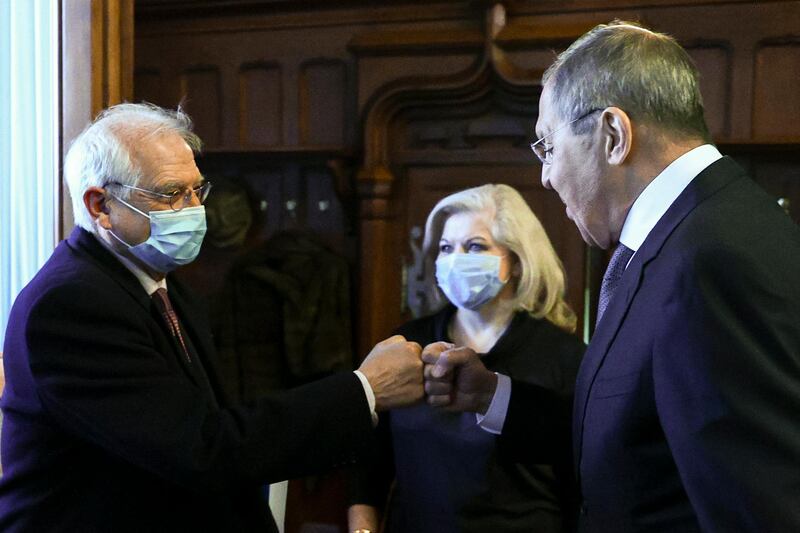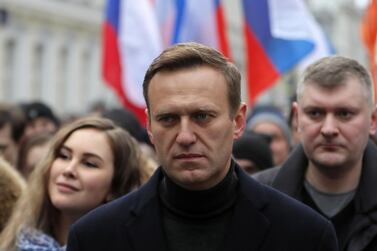The EU's most senior diplomat said Russia rejected engagment with the bloc, raising the possibility of more sanctions.
In a blog post, Josep Borrell said the expulsion of three EU diplomats during his two-day visit to Moscow showed that Russia "did not want to seize this opportunity to have a more constructive dialogue with the EU".
He said the situation showed that Europe and Russia were drifting apart.
“It seems that Russia is progressively disconnecting itself from Europe," Mr Borrell said.
In a challenge to Russia’s allies within Europe, he said the bloc will have to decide on the consequences for Russian actions.
Those will be for member states to decide, "and yes, these could include sanctions".
Mr Borrell's trip, which ended on Saturday, divided the EU's 27 members, with France and Germany favouring dialogue with the Kremlin.
Some countries backed a harder line after the jailing of Kremlin critic Alexei Navalny and a crackdown on his supporters that involved the arrests of more than 10,000 people in recent weeks.
The tone of the trip changed when Moscow expelled Polish, German and Swedish diplomats hours after Mr Borrell met Russian Foreign Minister Sergey Lavrov to discuss ties.
Western leaders criticised the expulsions, straining relations with Russia already tested after Mr Navalny was sentenced to two years and eight months in a penal colony for violating parole conditions while recovering from a poisoning attack in Germany.
My visit to Moscow highlighted that Russia does not want to seize the opportunity to have a more constructive dialogue with the EU. This is regrettable and we will have to draw the consequences.
— Josep Borrell Fontelles (@JosepBorrellF) February 7, 2021
Read my blog post:https://t.co/S3QP2uSsNO pic.twitter.com/q8pUDbEFAF
Mr Borrell described the trip as very complicated and said he returned to Brussels with deep concerns.
"At times, the discussion with my Russian counterpart reached high levels of tension, as I called for Mr Navalny’s immediate and unconditional release, as well as for a full and impartial investigation into the assassination attempt [against him]," he said.
Mr Borrell, whose views do not necessarily represent the 27 member states, defended his visit, arguing that criticising Russia from a distance "will not bring greater security to the EU".
"We have to face challenges, including meeting others on their home turf, just when negative events are unfolding" to better assess the action to take.
"If we want a safer world for tomorrow, we have to act decidedly today and be ready to take some risks," he said.
Mr Borrell said he also expressed EU support for human rights and political freedoms by paying tribute to Boris Nemtsov, an opposition figure, at the bridge in Moscow where he was murdered six years ago.
At the end of the my visit to Russia, I payed tribute to those who sacrificed their life and freedom to defend fundamental and human rights. I visited Boris Nemtsov’s 2015 assassination site.
— Josep Borrell Fontelles (@JosepBorrellF) February 7, 2021
Here the summary of my visit: https://t.co/3vISxRJDgF pic.twitter.com/Ogwr2lqHmd
Mr Borrell will brief foreign ministers from the 27 member states on February 22, and EU leaders will discuss ties with Moscow at a summit in March.
Drawing up EU sanctions would be up to the members states and require unanimity.
The European Commission said President Ursula von der Leyen had full confidence in Mr Borrell despite the way the visit turned out.
"The way the visit was organised, the way the press conference was going, what Mr Lavrov was saying, what the Russian authorities did against European diplomats on the very same day, offered a very clear indication in which [direction] Russia wants to go," an EC spokesman said.
The Kremlin defended expulsion but insisted it was interested in reviving relations with Brussels.
The expulsion was a "consequence of the actions of some diplomatic missions in Moscow against the backdrop of illegal riots," Kremlin spokesman Dmitry Peskov said.
He said that Russia "has clearly demonstrated it does not intend to tolerate this".
"Russia has been and remains interested in reviving relations between Moscow and Brussels," Mr Peskov said on Monday, adding that Moscow did not initiate "the collapse" of the relationship.
Also on Monday, a representative of the foreign ministry told Russian news agencies that Russia was surprised to learn of Mr Borrell's comments as they strongly contrast with his statements during a press conference in Moscow.
The EU will hold a video call with allies of Mr Navalny, joined by envoys from Britain, the US, Canada and Ukraine. That is likely to be the first forum for the West to consider any joint response to Mr Navalny's jailing last week and Friday's expulsions.
Since the Kremlin's annexation of Ukraine's Crimea in March 2014, Russia has been under western economic sanctions, with Nato accusing Moscow of seeking to undermine the West through disinformation and covert operations.
However, the West needs Russia as an energy supplier and as a regional power in diplomacy, such as for upholding the 2015 nuclear accord with Iran, and tackling climate change.








